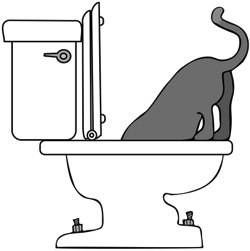Unfolding Drama
 The Grasshopper must prefer being heard during dog walks because he delivered this one yesterday during the daily pooch prance: “Life’s drama unfolds when we argue about the way it should be versus the way it is.”
The Grasshopper must prefer being heard during dog walks because he delivered this one yesterday during the daily pooch prance: “Life’s drama unfolds when we argue about the way it should be versus the way it is.”
I remember Jerry Stocking saying years ago that elongating your initial reaction turns into drama. That seems to be the case.
The reaction is this: “It shouldn’t be this way” and the longer we hold on to that reaction, the more drama we will produce.
We can’t help reacting to certain things; the reaction is there instantly without our permission. But the time frame the reaction stays with us is completely up to us.
So the real question is: How much less drama do you want in your life?
The remedy comes from a phrase I learned in a management seminar over 20 years ago: “Shorten the Storm.”
Shorten the storm in this case means to recognize that you are elongating your reaction and to choose a different response.
Imagine that someone cuts you off in traffic. Your initial, unplanned reaction is a tirade against the driver. Once you utter every curse word you can send their way, you are at a choice point. Do I let this continue or do I let it end. If you choose continue, you have chosen drama.
Seriously, how many go rounds do you have to have in your head about this incident to conclude that this person is an asshole? My guess is not more than one. Continuing on with the diatribe in your head, ad nauseam, will cause you to regurgitate drama.
Drama is produced by attempting to take something that is and pretend that going on and on about it will turn it into the way it should be. That never happens. Drama is always ineffective and never accomplishes changing “is” into “isn’t.”
We can all fold up our drama rather quickly by learning a lesson from my golfing buddy, Chris. When Chris hits a bad shot, he has his initial reaction which lasts under 10 seconds and then he’s on to the next shot. It’s one of the reasons I love playing golf with him – No Drama.
I’ll leave you with the message I once saw printed on a t-shirt that actress Uma Thurman was wearing: “Save Your Drama for your Mama.”
All the best,
John
Be Sociable, Share!

 I was wondering aloud if there was a difference between philosophy and ideology and, for me, there is.
I was wondering aloud if there was a difference between philosophy and ideology and, for me, there is. What a giant rock we must live under if we haven’t yet heard about living “in the moment” or what author
What a giant rock we must live under if we haven’t yet heard about living “in the moment” or what author  The Grasshopper offered this nugget last night: “Life happens between the question and answer.”
The Grasshopper offered this nugget last night: “Life happens between the question and answer.” The Grasshopper stepped out of his metro-sexual guise and delivered this: “You know you’ve turned the corner when it’s more about comfort than it is about style.”
The Grasshopper stepped out of his metro-sexual guise and delivered this: “You know you’ve turned the corner when it’s more about comfort than it is about style.” Rather than list a bunch of pet peeves, I decided to go one step further and list the people who perform these acts as “people I don’t want to know.”
Rather than list a bunch of pet peeves, I decided to go one step further and list the people who perform these acts as “people I don’t want to know.” I was watching a
I was watching a  The Grasshopper was channeling
The Grasshopper was channeling  I was talking about photography on the phone yesterday when the Grasshopper snapped in and said, “You can’t focus on what you can’t see.” My chat partner said, “Wow, what a metaphor.”
I was talking about photography on the phone yesterday when the Grasshopper snapped in and said, “You can’t focus on what you can’t see.” My chat partner said, “Wow, what a metaphor.”